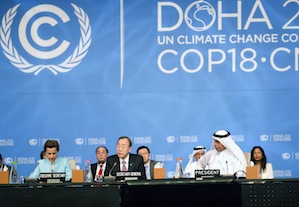 “Climate change is the biggest human rights challenge of our time” says former Irish president and UN Human Rights High Commissioner Mary Robinson following the conclusion of the recent UN Climate Summit in Doha.
“Climate change is the biggest human rights challenge of our time” says former Irish president and UN Human Rights High Commissioner Mary Robinson following the conclusion of the recent UN Climate Summit in Doha.
“It’s undermining livelihoods—rights to food and safe water and health and education. It’s having people displaced by climate, and that can bring conflict. We’re told that we are likely to have as many as 200 million climate-displaced people by 2050. That’s not very far away. Where will they go? What kind of conflict will that bring about?” she said.
Whilst the UN Secretary general Ban Ki-moon welcomed the outcome of the Doha Conference for paving the way to a comprehensive, legally binding agreement by 2015 he believes that far more needs to be done and called on Governments, businesses, civil society and citizens, to accelerate action on the ground so that the global temperature rise can be limited to 2° C.
That the need for action has become even more urgent was underlined by new World Bank President Jim Yong Kim who pointed to “unequivocal” scientific evidence for man-made climate change to urge countries to do more. Commenting on the recently released World Bank report “Turn Down the Heat” which highlights the devastating impact of a world hotter by 4 degrees Celsius by the end of the century, a likely scenario under current policies, he described climate change as “the single biggest challenge to social justice today,”
All nations will suffer the effects of a warmer world, but it is the world’s poorest countries that will be hit hardest by food shortages, rising sea levels, cyclones and drought, the report states. Recent research has also confirmed that predictions of global climate change made to a United Nations-organized panel more than 20 years ago have proved to be accurate or underestimated the rate and extent of climate change.
Among the myriad of extreme and record-breaking weather events to hit the planet in 2012 described in a report released at UN climate talks in Doha, an area of Arctic sea ice bigger than the United States melted this year. The World Meteorological Organization said the dramatic decline illustrates that climate change is happening “before our eyes.”